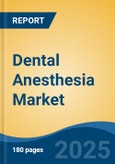Speak directly to the analyst to clarify any post sales queries you may have.
10% Free customizationThis report comes with 10% free customization, enabling you to add data that meets your specific business needs.
Key Market Drivers
Aging Population & Rising Dental Treatment Demand
A primary driver of dental anesthesia adoption is the growing global aging population, which increases the demand for both routine and complex dental procedures. According to the World Health Organization (WHO), the number of individuals aged 60 or above is projected to reach 2.1 billion by 2050, nearly double the number in 2015. This demographic shift brings a higher incidence of chronic conditions, such as gum disease, tooth loss, and root canal infections requiring effective anesthetic techniques to manage procedural complexity and patient comfort.In many communities, elderly patients account for a growing share of dental visits, often involving multiple extractions, implant placements, and periodontal surgeries. Effective anesthesia is essential not only to ensure procedural precision but also to support pain management in individuals who may have comorbidities or sensitivities. Public healthcare systems - like Medicare in the U.S. - regularly reimburse anesthesia services for complex dental treatments, encouraging widespread adoption.
Furthermore, the global rise in oral health awareness (where nearly 3.5 billion people suffer from untreated cavities according to WHO) strengthens patient demand for dental care. As dental clinics expand worldwide, anesthesia becomes a core standard of care, especially for invasive or anxiety-inducing treatments. Essentially, the convergence of an aging population, greater dental need, and systemic healthcare support significantly fuels growth in dental anesthesia usage.
Key Market Challenges
Shortage of Skilled Anesthesia Professionals
A major challenge lies in the limited availability of trained dental anesthesiologists and sedation-certified clinicians. According to the American Society of Anesthesiologists (ASA) and Association of American Medical Colleges (AAMC), the U.S. faces a projected shortage of 12,500-15,000 anesthesiologists by 2030, with a significant portion required for procedural sedation. In dentistry, stringent sedation protocols and safety regulations necessitate specialized training requirement many smaller clinics and rural providers struggle to meet.This shortage impacts service availability, extends wait times for sedation-requiring procedures, and limits anesthesia innovation adoption. The challenge is even more pronounced in developing regions, where healthcare worker density remains low, and specialized training is limited. Addressing this requires expanded training programs, cross-certification models, and task-sharing - many of which are currently under-supported.
Key Market Trends
Emergence of Needle-Free & Computer-Controlled Anesthetic Delivery
A significant trend advancing the dental anesthesia market is the development and adoption of needle-free and computerized anesthetic delivery systems. These technologies aim to improve accuracy, reduce injection pain, and enhance patient comfort. Needle-free jet injectors use high-pressure streams to deliver anesthesia through the skin, bypassing needles altogether - an approach especially valuable in pediatric dentistry. The 2024 clinical study found these systems to be as effective as traditional needle approaches and greatly reduced anxiety in children. Computer-Controlled Local Anesthetic Delivery (C-CLAD) systems regulate flow, pressure, and rate, allowing dentists to optimize dosing with minimal discomfort. These systems also support advanced protocols - such as palatal injection numbing for adult procedures - and align with precision dosing requirements in medically complex or elderly patients.Government-backed organizations, including the FDA, actively evaluate these devices for safety and efficacy, contributing to broader clinical adoption. This trend towards minimally invasive, patient-friendly technology significantly enhances clinical standards and drives innovation in dental anesthesia.
Key Market Players
- Septodont, Inc.
- Henry Schein, Inc.
- Dentsply Sirona, Inc.
- AstraZeneca, Plc.
- Abbott Laboratories, Inc.
- Gilead Sciences, Inc.
- Hospira, Inc.
- Hikma Pharmaceuticals, Plc.
- 3M Company
- Aspen Group
Report Scope:
In this report, the Global Dental Anesthesia Market has been segmented into the following categories, in addition to the industry trends which have also been detailed below:Dental Anesthesia Market, By Type:
- Local
- General
- Sedation
Dental Anesthesia Market, By Route of Administration:
- Intra-Oral
- Extra-Oral
Dental Anesthesia Market, By End User:
- Dental Hospitals
- Dental Laboratories
- Others
Dental Anesthesia Market, By Region:
- North America
- United States
- Mexico
- Canada
- Europe
- France
- Germany
- United Kingdom
- Italy
- Spain
- Asia-Pacific
- China
- India
- South Korea
- Japan
- Australia
- South America
- Brazil
- Argentina
- Colombia
- Middle East and Africa
- South Africa
- Saudi Arabia
- UAE
Competitive Landscape
Company Profiles: Detailed analysis of the major companies present in the Global Dental Anesthesia Market.Available Customizations:
With the given market data, the publisher offers customizations according to a company's specific needs. The following customization options are available for the report.Company Information
- Detailed analysis and profiling of additional market players (up to five).
Table of Contents
Companies Mentioned
- Septodont, Inc.
- Henry Schein, Inc.
- Dentsply Sirona, Inc.
- AstraZeneca, Plc.
- Abbott Laboratories, Inc.
- Gilead Sciences, Inc.
- Hospira, Inc.
- Hikma Pharmaceuticals, Plc.
- 3M Company
- Aspen Group
Table Information
| Report Attribute | Details |
|---|---|
| No. of Pages | 180 |
| Published | August 2025 |
| Forecast Period | 2024 - 2030 |
| Estimated Market Value ( USD | $ 2.11 Billion |
| Forecasted Market Value ( USD | $ 2.94 Billion |
| Compound Annual Growth Rate | 5.6% |
| Regions Covered | Global |
| No. of Companies Mentioned | 10 |









